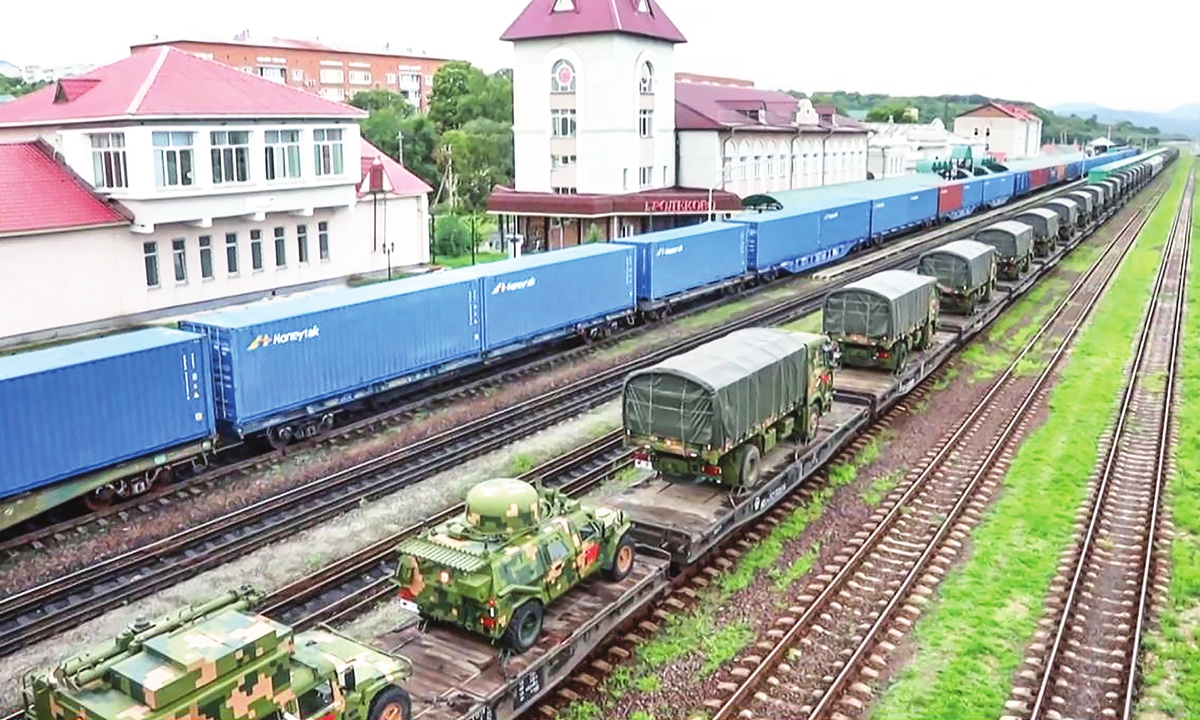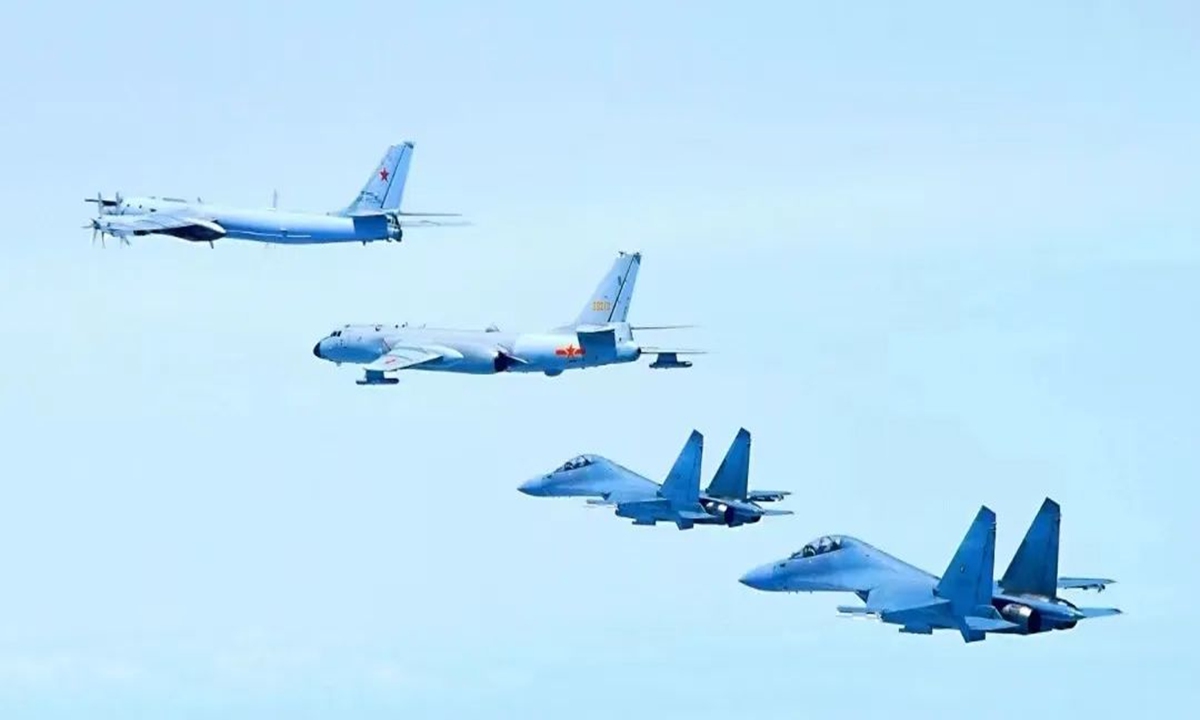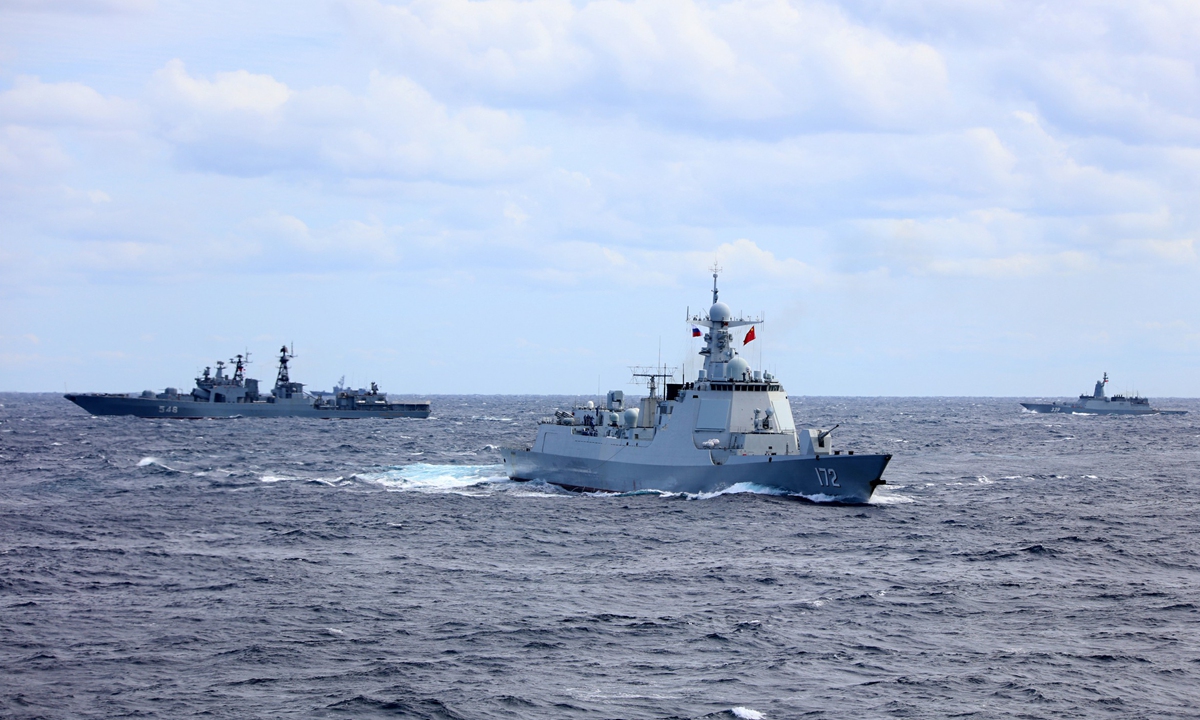
This screen grab obtained from a handout video released by the Russian Defence Ministry on August 29, 2022, shows Chinese armed convoy upon their arrival for Vostok 2022 military exercises at the Sergeevsky training ground at Primorskiy (Maritime) Kray of the Russian Far East. Photo: AFP

Two Chinese J-16 fighter jets conduct an escort mission for a Chinese H-6K bomber and a Russian Tu-95MS bomber during a regular China-Russia joint strategic patrol above the Sea of Japan, the East China Sea and the West Pacific on May 24, 2022. Photo: Screenshot from China Central Television
The upcoming military drills Vostok 2022 (East 2022) exercise launched by Russia with countries including China and India participating have attracted the usual speculation from Western media outlets, which hype security cooperation between China and Russia especially amid Russia's military operation in Ukraine. Some have also interpreted the normal military cooperation as a "threat," hinting on Russia's support for China on the Taiwan question. Experts said it is the US and the West's commonly used tactics to portray Russia-China tie-up in a negative light, in order to unite allies and serve their geopolitical purposes.
The Vostok 2022 strategic command and staff drills will run from September 1 to 7 under the command of Chief of Russia's General Staff Valery Gerasimov on the territory of Russia's Eastern Military District and will be the final stage of the training of the Russian Armed Forces this year, according to the Russian media report.
And the strategic exercise will bring together over 50,000 troops and more than 5,000 items of armaments and military hardware, in particular, 140 aircraft, 60 combat ships, gunboats and support vessels.
The Russian and Chinese navies will operate in the Sea of Japan in the Vostok 2022 strategic drills, Russian Deputy Defense Minister Alexander Fomin told a briefing for foreign military attaches on Monday, TASS reported.
According to the latest footage unveiled by the Russian Ministry of Defence, foreign military personnel and equipment participating in the Vostok 2022 arrived at the Sergeevsky training ground in the Primorsky region on Monday, according to Russian media outlet Ruptly. In addition to the Russian Armed Forces, foreign formations from China, Belarus, Azerbaijan, Armenia, Syria, India and other states will take part in the exercises.
This is the first time the Chinese People's Liberation Army (PLA) has sent all three of its forces to participate in a single Russian drill, observers said earlier. The PLA dispatching troops to participate in Russia's military drills is also based on the annual China-Russia military cooperation plan and consensus reached by the two sides.
A flotilla of Chinese naval vessels consisting of the 10,000 ton-class Type 055 large destroyer Nanchang, the Type 054A guided missile frigate Yancheng and the Type 903A comprehensive supply ship Dongpinghu sailed through Tsushima Strait, from the East China Sea into the Sea of Japan on Tuesday, according to the Japanese Ministry of Defense. The Chinese naval flotilla is likely to head to Russia to participate in the Vostok 2022, observers said.
Despite that both Russian and Chinese sides said that the exercise isn't directed against any specific countries or military alliances, some Western media and officials hyped a potential military alliance between Moscow and Beijing, and some claimed that defense ties between the two countries have grown stronger since Russia's military operation in Ukraine in February, and hinted on Russia's support for China over the recent tensions in Taiwan Straits triggered by the provocative visit by US House Speaker Nancy Pelosi.
Some Western media claimed such military partnerships worry the EU and the US, and media outlets like the Daily Mail hyped that the new plans for Russia-China military drills in the Sea of Japan will likely alarm Taiwan, indicating that Russia could back a potential military operation of China on Taiwan island.
China-Russia military and security cooperation serves each other's core interests, does not target any third party and is conducive to regional peace, stability and development, Chinese Ambassador to Russia Zhang Hanhui told the Global Times in an exclusive interview recently.
It will not be affected by the external environment, Zhang said, noting that China highly values the China-Russia military and security cooperation and will jointly work with Russia to promote bilateral military and security cooperation to a higher level and to cover broader areas.

A China-Russia joint naval ships formation sails in the East China Sea on October 23, 2021. Photo: Li Tang
False narratives
Compared to the frequency and the scale of military drills launched by the US-led West, China's normal exercises are much smaller and less frequent with the aim of safeguarding regional peace and security, experts said, for example, Russia's military drills are being held as the US is participating in Exercise Pitch Black, which is joined by Australia and other 15 countries.
"Some Western countries and the US usually define the China-Russia relations in a new era with their own ill-intentioned mindsets," Song Zhongping, a Chinese mainland military expert and TV commentator, told the Global Times on Tuesday.
China and Russia are in fact engaged in an all-round strategic partnership in political, economic, military, scientific and technological fields, striking a contrast with the so-called US military alliance as the latter is unequal partnership in which Washington's allies should serve American interests first, Song said.
Jeffrey Sachs, an economist at Columbia University, said in a recent column that "the relentless Western narrative that the West is noble while Russia and China are evil is simple-minded and extraordinarily dangerous. It is an attempt to manipulate public opinion, not to deal with very real and pressing diplomacy."
The essential narrative of the West is built into US national security strategy, Sachs wrote. The core US idea is that China and Russia are implacable foes that are "attempting to erode American security and prosperity." These countries are, according to the US, "determined to make economies less free and less fair, to grow their militaries, and to control information and data to repress their societies and expand their influence," he noted.
Despite that the US and the West have ramped up efforts in depicting Russia and China as a collective threat - a move only serves their own strategic purposes, the world is moving toward a "multipolar model," some world leaders predicted.
The unipolar model of the world has become obsolete and will be superseded by a new world order based on the recognition of the sovereign path of each nation, Russian President Vladimir Putin said in an address to the 7th Eastern Economic Forum posted on the Kremlin's website on Monday, TASS reported.
India's participation could also be seen as an embodiment of the drills not targeting a third party, Song said.
Zhang, the Chinese envoy to Russia, told the Global Times that the growth of the developing countries and emerging markets represented by China and Russia has driven adjustment of the international landscape in terms of speed, breadth and depth.
"It is changing the world political and economic landscape in an all-round way and pushing the international political and economic landscape toward multipolar," he said.
The US is trying to shape up a narrative of treating China and Russia as a whole, as if it takes them separately, it means that Washington has to adjust its short-term and long-term strategies by putting Europe as a priority or Asia first, Cui Hongjian, director of the Department of European Studies at the China Institute of International Studies, told the Global Times on Tuesday.
"To avoid inequalities in its resources in terms of foreign policy, the US uses such narrative to unify its allies in Europe and in Asia at the same time to enhance its hegemony in the world," he said.
Beside hyping China-Russia military cooperation, some Western media also highlighted since the Ukraine crisis, China has been moving to fill the "void" left by the West sanctions on Russia, for example, between January and July this year, China increased its seaborne imports of heavily-discounted Russian Urals crude by 40 percent, compared to the same period last year, CNN reported on Sunday.
"The unilateral sanctions of the US and the West are a boomerang, which not only aggravate their domestic inflation and economic crisis, but also shake the world's confidence in the US dollar system and accelerate global de-dollarization," Zhang said.






